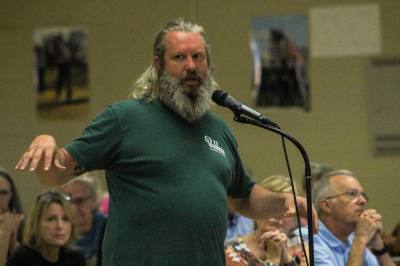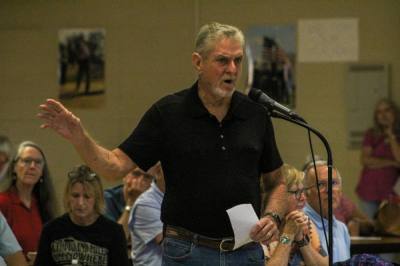The Texas Commission on Environmental Quality held a public hearing June 8 at Smithson Valley High School regarding the proposed permit filed by a local landowner and JA Wastewater LLC.
The wastewater treatment facility would serve the Harrison Tract subdivision, a new 1,403-lot subdivision in Comal County. The landowner, Doug Harrison, is also the president of the Lake Dunlap Water Control and Improvement District in New Braunfels.
Current situation
According to the Pollutant Discharge Elimination System application receipt, the discharge route would be from the domestic wastewater facility located about 0.4 miles south of the Harrison Road and Hwy. 46 intersection to the West Fork of Dry Comal Creek, which flows into the Comal River in New Braunfels.
TCEQ staff attorney Harrison Malley emphasized at the hearing that nothing has been approved.
“The only thing that's happened here is that staff has preliminarily reviewed the application, and based on what they have submitted, it complies with state's rules, and that's it. Tonight is an opportunity for you to tell us things that we don't know yet,” Malley said.
The wastewater plant would have a routine inspection every three years unless a filed complaint warrants additional inspections, according to TCEQ representatives.
According to the applicant, the developer intends to use 100% of the wastewater developed by the plant. The TCEQ said although it applied for the full-use permit, it needs to first have the wastewater discharge permit approved.
“When we submitted the application to the TCEQ, we also submitted a 210 Reuse Permit,” said Helen Gilbert, an attorney for law firm Barton Benson Jones. “A reuse authorization application, the intent is to reuse 100% of the water on the site and not discharge anything.”
According to the TCEQ, if the wastewater treatment plant dumped a maximum amount of 600,000 gallons of treated water into the Dry Comal Creek, less than an inch of water would be added to the creek when it is discharging.
Kris Bolstad, who owns Comal Tubes in New Braunfels, asked what he is supposed to tell tourists who float the river when they ask about the 600,000 gallons of wastewater flowing into the river.
TCEQ Environmental Permit Specialist Venkata Kancharla said the agency performs a technical review to ensure existing water use can be continued.
“This is part of the process of educating everyone about the wastewater treatment plant, the discharge of the quality of effluent and ensuring that the water is protected,” Kancharla said.
Sorting out details
According to the permit application, the wastewater treatment plant is needed because the new development does not have a facility within 3 miles of it that can accept its waste. The treatment plant would also act as infrastructure for future developments.
“It is the intent of the facility to provide capacity for future regional developments other than the Harrison Tract subdivision,” the permit states.
Harrison said the hearing made him realize they've done a “horrible job” of facilitating the conversation about what the plans are and emphasized that no water would leave his property.
“One hundred percent of treated water will be used on-site,” Harrison said. “So when we filed for the wastewater permit, we also filed for a reuse permit, and then that water in the [treated wastewater] pipe systems you see in some subdivisions would be used for irrigation in some of the common areas and around the property, so there is zero water that would ever leave our fence line.”
Harrison said his main preference is to have someone purchase the property for agricultural use, and having a high-density development was at the bottom of his list of how to utilize the property.
“At the very, very bottom of our list is we may sell it to a high-end developer with those entitlements on it,” he said.
But Harrison said he is “100%” confident that the permit will ultimately get approved for several reasons.
“Because we are going to use a reuse permit, we use all the water on-site; that helps us get the permit,” Harrison said. “We're over a mile from the back of the fence, which helps us get the permit. And we'll clean the water to a standard that is over three times better than what is across the street at my ranch.”
Those opposed
“I’m very happy to hear that there is an intention to reuse the water that’s coming out of the wastewater treatment plant because that’s both economically and ecologically more responsible,” Comal County resident Bruce Carpenter said. “But intention doesn't always actually happen.”
Local concerned citizens united together to create the Dry Comal Creek Neighbors group.
Austin Faught, the chair of the group, said it is made up of residents immediately downstream of the property alongside others in the community.
“My family and neighbors have serious concerns about the negative effects on the construction of a wastewater facility here,” Faught said. “Our primary issue, number one, is that the project is located over the Edwards Aquifer contributing zone. [We are] especially concerned about caves.”
Faught said the second major concern for the group is the wastewater discharge would have a negative impact on residents’ drinking water.
“There's data that suggests that there are 48 water wells [within a] very short distance to [the wastewater] discharge, 43 of which are used for household purposes,” Faught said. “We're very concerned about the discharge affecting our drinking water, particularly since there seems to be no regulatory guidance on pharmaceuticals and microplastic.”
Next steps
A final decision on the application has yet to be made.
TCEQ staff will review formal comments provided during the meeting as well as comments received through the mail, fax and online before making a final decision. Responses will be mailed to those who contested the proposed permit both orally and in writing.
Once the complainants receive their response, they will have 30 days to file a request for a contested case hearing, where residents will have to identify how they would be specifically affected by the proposed permit. The TCEQ will then consider all of the contested case hearings and ultimately decide if it will grant the permit.








